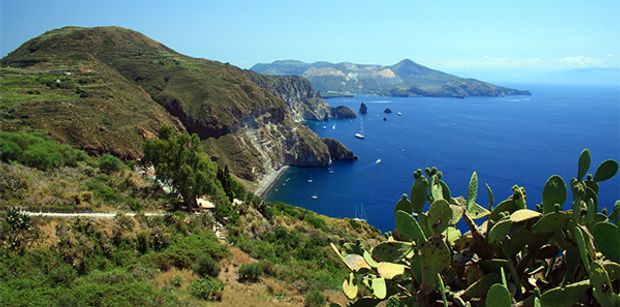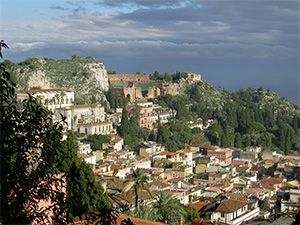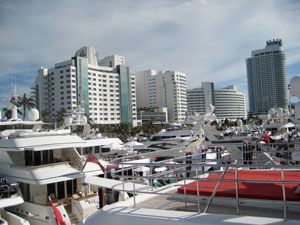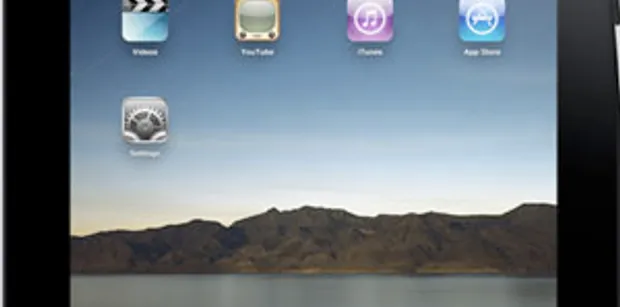Palermo
Sicily’s regional capital and largest city is perhaps best compared to a rough, uncut jewel. Its beauty has to be revealed through careful discovery. You’ll find this bustling city chaotic and dusty yet fascinating. The historic environment of this former royal capital of kings and emirs is largely Baroque with some stunning nuggets of medieval architecture. There are a number of monasteries and castles, and a magnificent cathedral, as well as art galleries and a good archeological museum. Monreale is only a few kilometers outside town. See our Palermo Charter Yachts.
Special tip:
The “Feast of Santa Rosalia”, in July is the most famous and popular festival in Sicily. During one week, Palermo becomes an open-air theater. The highlight is a 15m high float known as the carro, which is paraded through the streets along with a statue of Santa Rosalia on a huge cart drawn by horses. Bands, dancers, African drums, religious choruses, fireworks, theatrical performances and feasts (featuring everything from delectable tiny snails to fantastic gelato) characterize the event.
Erice
Standing at the top of a mountain, the delightful town of Erice overlooks nearby Trapani and the beaches of San Vito Lo Capo.
There are some ancient Elymian and Phoenician walls surrounding the northeastern side of the city, and two castles, Pepoli Castle, with foundations dating from Arab times, and nearby Venus Castle, dating from the Norman period but built on ruins of the ancient Temple of Venus. Surrounded by a lush park, the hilltop castles alone are worth a stop in Erice, which offers charming old stone streets and several medieval churches. The view from the castle towers is stupendous. You’ll find some good restaurants in Erice to try the local speciality: Couscous with fish. There are also several exceptional pastry shops, including Maria Grammatico’s in the centre of town.
Special tip:
“International Couscous Festival”, San Vito Lo Capo. This annual event outside Trapani means 3 days of dancing to live music and a bounty of local foods. The couscous competition draws some of the best cooks in the world, including those from North Africa where the dish originated. You’ll gain 10 pounds if you participate in all of the feasting.
Wine Country
Sicily’s viticultural region covers a large patch of the western part of the island. Marsala is the commercial center of this scenic region, the origin of the world famous Marsala wine. It’s a magical place that rivals any grape-growing region in the world in its serene magnificence. It also has what is in some ways a more distinguished history. That’s because domesticated grapes were cultivated here long before they were introduced into France or northern Italy.
Cefalù
Nestled between the Madonie Mountains and the sea, Cefalù’s mountain boasts the ruins of a large fortress and an ancient Sicanian-Greek temple with a stunning view from the summit. Cefalù is one of the Mediterranean’s undiscovered jewels and the epitome of picturesque grandeur. With its winding, narrow, medieval streets, delightful restaurants overlooking a rocky coast and a beautiful beach Cefalù is definitevely worth a visit.
Aeolian Islands
Often called the Aeolian Islands (Aeolus, god of the winds), the Lipari Islands are a volcanic archipelago visible from Sicily’s eastern Tyrrhenian coast, easily accessible from Milazzo and Messina. The principal islands are Lipari, Salina, Filicudi, Alicudi, Stromboli, Panarea and Vulcano. Here you’ll find beautiful scenery, volcanoes, castles, thermal resorts, water sports, good fishing and, of course, some great beaches like the unique Spiaggia di Sabbia Nera (Black Sand Beach) on Vulcano or the Spiaggia Bianca (White Beach) and Ponente (Marina Lunga) on the larger island of Lipari.
The rugged landscape with deep caverns, steep cliffs, and splendid views is amazing and the cuisine fantastic, especially the seafood dishes. See our Aeolian Islands Yacht Charter Guide.
Special tip:
Stromboli in the Aeolian Islands is one of the world’s most active volcanoes and its pyrotechnics are spectacular. Take a night-time boat trip to Sciara del Fuoco and experience close-up the rumblings, bellowings and glow of incandescent lava from Stromboli’s mysterious cone
Taormina
 Taormina is the Sicilian Monte Carlo, without the casino or royal family. Taormina has endlessly winding medieval streets and tiny passages, each with its own secrets –great restaurants, cafés and ice cream bars. Some of these intriguing places are secluded gardens hidden by stone walls, others are set on terraces overlooking the coast or in more public but equally pleasant squares. Taormina is beautiful by day but in the evenings its atmosphere is simply enchanting, whether you stroll the illuminated streets or indulge in the view of the coast over a delicious dinner. Within its eternal stone walls, old Taormina has fascinating archeological monuments and medieval homes. Magnificent views of the sea complete the picture. The most famous is the view overlooking the Greco-Roman amphitheatre, one of Sicily’s largest, with Mount Etna and the sea in the background
Taormina is the Sicilian Monte Carlo, without the casino or royal family. Taormina has endlessly winding medieval streets and tiny passages, each with its own secrets –great restaurants, cafés and ice cream bars. Some of these intriguing places are secluded gardens hidden by stone walls, others are set on terraces overlooking the coast or in more public but equally pleasant squares. Taormina is beautiful by day but in the evenings its atmosphere is simply enchanting, whether you stroll the illuminated streets or indulge in the view of the coast over a delicious dinner. Within its eternal stone walls, old Taormina has fascinating archeological monuments and medieval homes. Magnificent views of the sea complete the picture. The most famous is the view overlooking the Greco-Roman amphitheatre, one of Sicily’s largest, with Mount Etna and the sea in the background
Mount Etna
With approx. 3350 meters, Sicily’s greatest natural attraction is Europe´s highest active volcano. Over 1200 square meters of Etna’s surface is covered with solidified lava. Etna offers skiing in the winter months and breathtaking hikes in the woods during the summer. There are also a number of smaller peaks on the slopes of Etna, and some interesting caverns to visit.
Catania
Catania as the economic center, is a great tourist attraction of Sicily. Located on the east coast of the island, at the foot of the active volcano Mount Etna, halfway between Messina and Siracusa, Catania is known for ancient Roman monuments, baroque and historical churches, palaces, liberty style mansions, urban parks, and numerous other sites. It is also famous for its La Playa beach.
Siracusa
Siracusa offers a nice mix of ancient and modern, on the eastern coast of Sicily. It is an attractive old town known for its Greek ruins. Once described by Cicero as “the greatest Greek city and the most beautiful of them all,” the ancient center of Syracuse is on the UNESCO World Heritage List. Neapolis is the ancient city that has the Greek Theatre, Quarries, Caves and Roman Amphitheatre. Other attractions of the town include Apollo Temple, Old Town on Ortygia Island, Cathedral, Piazza Del Duomo, Sanctuary Madonna Della Lacrime, Maniace Castle in Ortigia, and Ipogeo in Duomo Square.
Piazza Armerina
Set on a plateau almost 700 meters above sea level the city of Piazza Armerina is a quaint little town. Its historical quarter has some beautiful churches as well as a well-preserved fortress (Spinelli Castle), but a “must see” is the Roman Villa, with its magnificent mosaics. Depicting scenes from daily life, such as hunting, the mosaics are as remarkable for their sociological value as for their artistry.
Special tip:
For four days beginning around the 12th of August Piazza Armerina celebrates “Palio dei Normanni”. Sicily’s Norman past is observed during this historic celebration in which locals dress in ancient costumes for parades. The city’s four districts -Canali, Casalotto, Castellina and Monte- are represented in the competitive events of the Palio. There is also music, dancing, demonstrations of medieval arts, and the sale of arts and crafts. And, of course, plenty of delicious food.
Make sure you also read our Sicily Yacht Charter Guide, for more information about chartering a yacht from the beautiful island of Sicily.
 Boatbookings was at the Miami Boat Show yesterday in chilly weather, and saw plenty of excellent charter yachts. We also attended a captivating presentation about Cuba and their plans for building the yacht charter industry in the waters that Hemmingway loved so much.
Boatbookings was at the Miami Boat Show yesterday in chilly weather, and saw plenty of excellent charter yachts. We also attended a captivating presentation about Cuba and their plans for building the yacht charter industry in the waters that Hemmingway loved so much.


 Taormina is the Sicilian Monte Carlo, without the casino or royal family. Taormina has endlessly winding medieval streets and tiny passages, each with its own secrets –great restaurants, cafés and ice cream bars. Some of these intriguing places are secluded gardens hidden by stone walls, others are set on terraces overlooking the coast or in more public but equally pleasant squares. Taormina is beautiful by day but in the evenings its atmosphere is simply enchanting, whether you stroll the illuminated streets or indulge in the view of the coast over a delicious dinner. Within its eternal stone walls, old Taormina has fascinating archeological monuments and medieval homes. Magnificent views of the sea complete the picture. The most famous is the view overlooking the Greco-Roman amphitheatre, one of Sicily’s largest, with Mount Etna and the sea in the background
Taormina is the Sicilian Monte Carlo, without the casino or royal family. Taormina has endlessly winding medieval streets and tiny passages, each with its own secrets –great restaurants, cafés and ice cream bars. Some of these intriguing places are secluded gardens hidden by stone walls, others are set on terraces overlooking the coast or in more public but equally pleasant squares. Taormina is beautiful by day but in the evenings its atmosphere is simply enchanting, whether you stroll the illuminated streets or indulge in the view of the coast over a delicious dinner. Within its eternal stone walls, old Taormina has fascinating archeological monuments and medieval homes. Magnificent views of the sea complete the picture. The most famous is the view overlooking the Greco-Roman amphitheatre, one of Sicily’s largest, with Mount Etna and the sea in the background